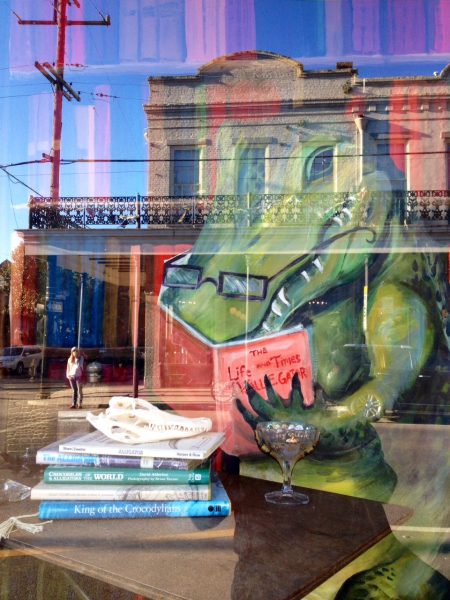Is “The Butterfly Effect” typical of your writing style and subject matter? How is it the same? Different?
That’s a difficult question to answer. Although I’ve always wanted to write, I’ve only been writing “in anger,” as it were, for a year. So I’m still very much finding my voice and style. But I suppose it’s typical of what I’ve done so far to the extent that it is not terribly cheerful. It also—somewhat obliquely—deals with a recurring obsession of mine, namely the bittersweet permanence and transience of memory, and the extent to which our identity is bound up with our recollections. The loss of personality due to conditions such as Alzheimer’s has been written about a lot, but in “The Butterfly Effect” I was thinking more of the converse situation—the inability to forget. The repetitive, compulsive reiteration of bad memories, the inability to put the past to rest, is so damaging. It erodes the self. And “The Butterfly Effect” is different from what I’ve written before in that it’s the shortest piece I’ve done. It’s also the only story I’ve written that’s set in the USA. But I’ve been to America a lot, including San Francisco and Iowa, so I think I’m allowed.
You have lived in Asia, Europe, and now reside in the UK. Has exposure to different cultures influenced your writing? In what way?
Definitely. I have a bunch of short fiction that could not have been written without my expatriate upbringing in India, and some of my other stories have their genesis in the time I spent working in Switzerland. Perhaps being a foreigner feeds the inner writer, in that you tend to sit back and observe more than you do when you’re in your native environment. And in consequence you notice differences more: differences of geography and culture, of sounds and scents, people and place. For example, India provided me with sensations that I’ll never forget, from the sweet yellow stink of a jackfruit to the delicate, scented iridescence of a butterfly’s wing (did you know some butterflies have perfumed wings? Well, they do), from the tongue-rolling cadences of Tamil to the aspirants of Hindi. And in Switzerland I found different forms and flavours again … It’s all good material!
What draws you to work in the smaller canvases of short fiction and flash fiction in particular? What challenges do working in those formats bring?
Part of it is pragmatism. I work full time and have a young family, so my writing time is limited to a couple of hours each morning and a few hours on the weekend if I am lucky. When you are working in small bursts, with limited time, it’s easier to focus on shorter fiction. At least I find it so. And part of it is that I like short stories, both to read and write. Always have, always will. I don’t understand why they are not more popular. But yes, they can be challenging, at least to write. For me, the challenges are two-fold: first, the obvious one of telling an original story that engages and moves, or at least entertains the reader within these very strict, artificially-imposed constraints of space; and second, the fact that there is nowhere to hide. I suspect that you can get away with a few mistakes in a novel (pace novelists!), but in a short story they are just so visible.
Do you have any pre-writing rituals or routines that you follow, or a special playlist or music genre that you listen to while writing?
No rituals other than making a strong cup of tea before I start. I can tell how well things have gone by how much of it gets drunk; an empty mug means a slow session. If it got forgotten then I know I was on fire. And I cannot write with music. My ideal writing environment would provide near-total sensory deprivation, but that’s never going to happen. So the next best thing is getting up at 4:30 AM and getting in a couple of hours while it’s still dark, before everybody else wakes up. Only the cat disturbs me, but I can put up with him.
Which UK authors should be getting more attention in the states?
Adam Marek. Good, well-written, inventive short stories. Often a little bizarre, but I like that. For example, his collection of shorts titled The Stone Thrower is well worth a try, if you like to push the envelope.
Any new projects we should look out for on the horizon?
I’m not sure if we can call it a project, that sounds far too organized, but I’m trying to get enough material together for two or three collections of short stories. The idea is that each collection would be linked by different themes. For example, the collection which is closest to completion deals with aspects of the mind: memory, consciousness, free will, what it means to be human, and so forth. Another collection is forming around the theme of ghosts, as I’ve always been a sucker for a good spooky story—M.R. James is one of my favourite authors. My vague hope is that once I’ve got these collections together I will have the courage to attempt writing a novel, the plot for which is slowly festering in the back of my mind. One day!



 The SmokeLong Grand Micro Contest (The Mikey) is now an annual competition celebrating and compensating the best micro fiction and nonfiction online.
The SmokeLong Grand Micro Contest (The Mikey) is now an annual competition celebrating and compensating the best micro fiction and nonfiction online.